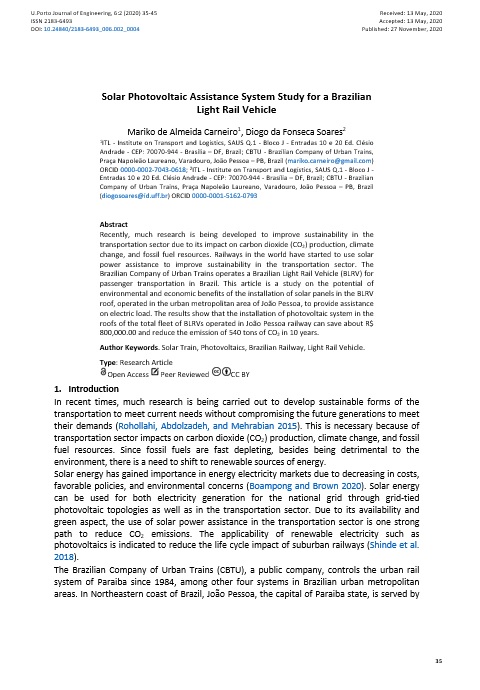Solar Photovoltaic Assistance System Study for a Brazilian Light Rail Vehicle
Main Article Content
Abstract
Recently, much research is being developed to improve sustainability in the transportation sector due to its impact on carbon dioxide (CO2) production, climate change, and fossil fuel resources. Railways in the world have started to use solar power assistance to improve sustainability in the transportation sector. The Brazilian Company of Urban Trains operates a Brazilian Light Rail Vehicle (BLRV) for passenger transportation in Brazil. This article is a study on the potential of environmental and economic benefits of the installation of solar panels in the BLRV roof, operated in the urban metropolitan area of João Pessoa, to provide assistance on electric load. The results show that the installation of photovoltaic system in the roofs of the total fleet of BLRVs operated in João Pessoa railway can save about R$ 800,000.00 and reduce the emission of 540 tons of CO2 in 10 years.
Downloads
Article Details
Authors who publish with this journal agree to the following terms:
- Authors retain copyright and grant the journal right of first publication with the work simultaneously licensed under a Creative Commons Attribution License that allows others to share the work with an acknowledgement of the work's authorship and initial publication in this journal.
- Authors grant the journal the rights to provide the article in all forms and media so the article can be used on the latest technology even after publication and ensure its long-term preservation.
- Authors are able to enter into separate, additional contractual arrangements for the non-exclusive distribution of the journal's published version of the work (e.g., post it to an institutional repository or publish it in a book), with an acknowledgement of its initial publication in this journal.
- Authors are permitted and encouraged to post their work online (e.g., in institutional repositories or on their website) prior to and during the submission process, as it can lead to productive exchanges, as well as earlier and greater citation of published work (See The Effect of Open Access).

